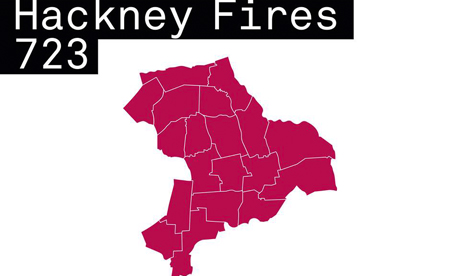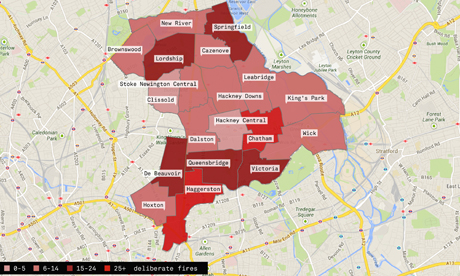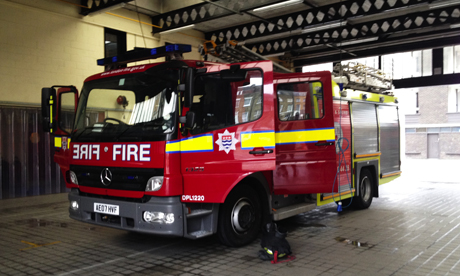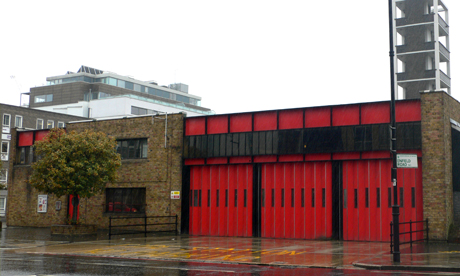Kingsland Fire Station closure sparks alarm

From May 2012 to May 2013 there were 723 fires in Hackney. The London Fire Brigade says this figure is ‘worse than average’. Image: Zachary Boren
Blaze hotspots are among the areas set to be most gravely impacted by the closure of Kingsland Fire Station this month.
Haggerston ward has more fires than any other ward in the borough and neighbours De Beauvoir, where Kingsland Fire Station is located.
Figures provided by the Greater London Authority show there were 499 incidents and 82 blazes in Haggerston in 2011/12 and 25 deliberate fires between October 2011 and September 2013.
Only Chatham has more deliberate fires than Haggerston – 31 – but it will remain serviced by Homerton Fire Station.
Response times in De Beauvoir and Queensbridge wards are set to soar to well above the London Fire Brigade’s six minute target.
Incidents of arson are higher in these wards than almost anywhere else in Hackney.

Infographic showing the overall number of deliberate fires in Hackney wards between October 2011 and September 2013. Image: Zachary Boren
The imminent closure of Bow Fire Station in Tower Hamlets, which closely neighbours Wick and Victoria wards in Hackney, will also affect response times.
‘Worse than average’
With 723 fire incidents in the year after May 2012, Hackney has been labelled ‘worse than average’ by the London Fire Brigade.
The borough will have the fewest fire stations in its bracket – two fewer than Lambeth and Croydon, and one fewer than Hillingdon and Tower Hamlets.
Boris Johnson’s controversial closure plan will go ahead this month after Hackney Council failed in its bid to secure a judicial review challenging the shutdown.
Mayor Johnson insists the closure is needed to ensure there is a balanced Fire Authority budget for 2014-15.
Seven London councils joined forces to fight for a judicial review in the High Court, but judges rejected their pleas.

A fire engine inside Kingsland Fire Station. Photograph: Stephen McGrath
Hackney Council’s Deputy Mayor Sophie Linden said: “I’m very disappointed with this result. But I am more disappointed that the Mayor of London chose to ignore the very real concerns of residents to force through these plans which put lives at risk.
“As a result of these damaging cuts, a third of Hackney will now fall outside London Fire Brigade’s recommended response time and residents in De Beauvoir ward will have to wait more than three minutes longer for vital, life-saving assistance.”
De Beauvoir resident Myles Wolfers, 22, who watched as crews from Kingsland Fire Station put out a blaze next to his home last year, said: “I haven’t seen any independent evidence that the fire service could be cut without there being an impact.”
Boris Johnson is closing 10 fire stations across London as part the Mayor’s Fifth London Safety Plan initiative, designed to save £29 million.

Kingsland Fire Station will close this month. Boris Johnson claims the closure will not affect residents’ safety. Photograph: Francesca Fanshawe
Opposition politicians of all stripes have rushed to condemn the plan, but the Mayor of London insists it is vital for the emergency service to achieve financial stability.
Mayor Johnson has added that keeping Londoners safe remains a “top priority”, and he claims the fire station closures will not endanger lives.
‘Fire stations do not stop fires’
A London Fire Brigade spokesperson: “The number of fires we attend has gone down by half in the last ten years, and our latest figures show that fires continued to fall at the same rate last year.
“London will remain amongst the very best of any emergency service in the UK and firefighters will continue to carry out community safety work to prevent fires at the same level as they do now. Fire stations and fire engines do not stop fires happening – proactive prevention work does.”
“The ward level data shows how varied response times are across the capital. As is the case now, over half of all London wards would, on average, continue to get a first response within the six minute target if the proposals are agreed. London will continue to receive a very good service, compared to other emergency services and other parts of the country.”
The Fire Brigade Union, whose members went on strike on New Year’s Eve over pension changes, says storms and floods in parts of England earlier this month highlighted the “valuable and wide-ranging job” done by firefighters.
The union is engaged in a dispute with the government over pensions.
Flood risk
Chair of the London Fire and Emergency Planning Authority James Cleverly said this month that the role of the London Resilience Forum, which focusses on emergency risk in the capital, should be expanded to include reducing potential impacts of extreme weather events.
Boris Johnson’s environment advisor recently acknowledged that London is likely to experience and “extreme weather event”, most probably in the form of a flood from intensive rainfall.
680,000 properties in the capital, including in low-lying areas like Hackney, are potentially at risk.
